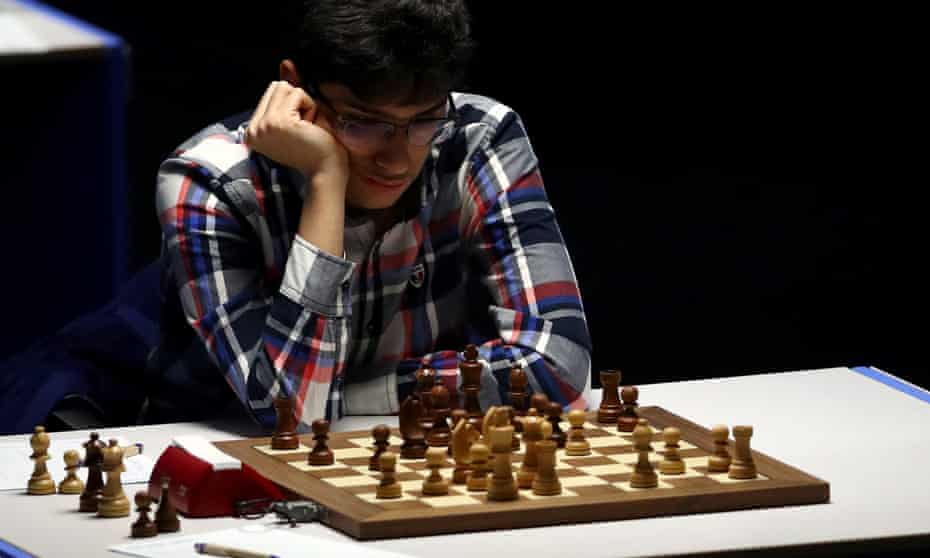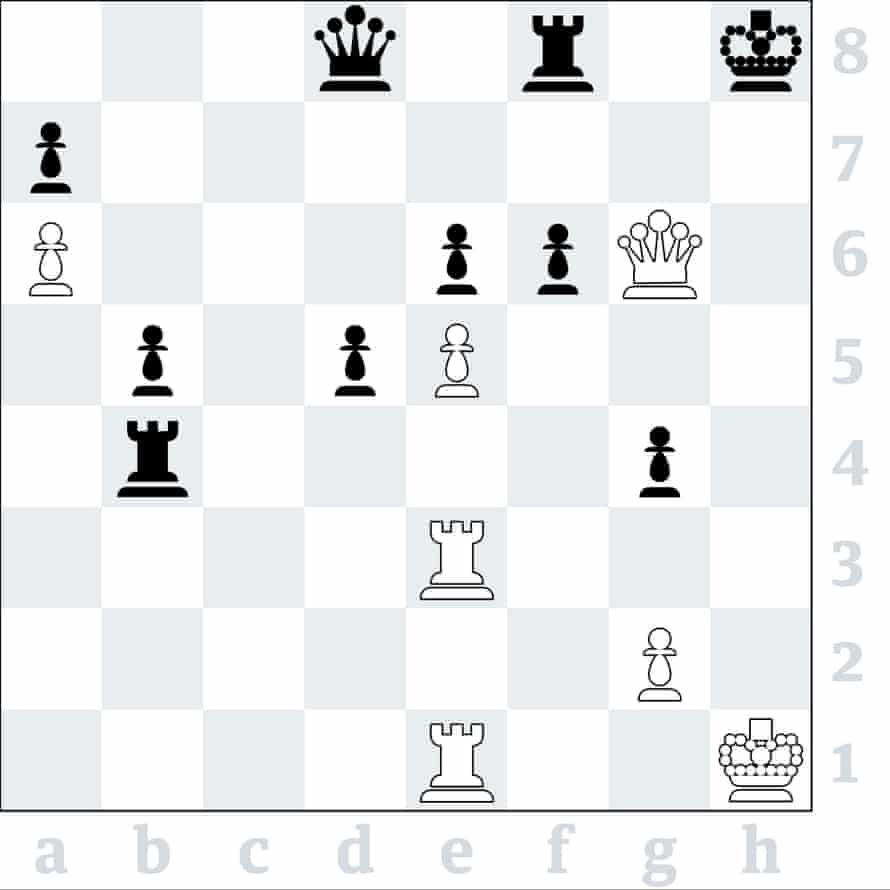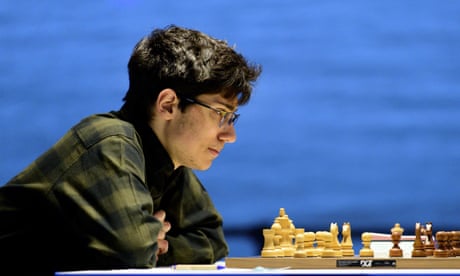Chess: Teenager Alireza Firouzja aiming to be youngest ever world champion
The Iran-born 18-year-old, who now represents France, is the third youngest Candidate after Magnus Carlsen and Bobby Fischer and has Garry Kasparov’s 1985 record in his sights

Alireza Firouzja qualified for the 2022 Candidates by scoring 8/11 at the Grand Swiss in Riga and has a chance to become world champion next year.
Photograph: Dean Mouhtaropoulos/Getty
Leonard Barden
Fri 12 Nov 2021
Alireza Firouzja, the Iran-born 18-year-old who emigrated to France due to Tehran’s punishments for playing Israeli opponents, has become the third youngest Candidate in chess history, with a chance of a glittering prize, the youngest ever world champion.
Firouzja scored 8/11 in the Grand Swiss in Riga to earn a place in the eight-player 2022 Candidates, whose winner will play for the global crown later next year. He reached his target two months younger than Boris Spassky at Gothenburg 1955, and is the third youngest Candidate qualifier, behind only Magnus Carlsen at 15 at the 2005 World Cup and Bobby Fischer at 15 and a half at the 1958 Portoroz interzonal.
Garry Kasparov was the youngest world champion at 22 years and six months when he defeated Anatoly Karpov in their 24th and final game in 1985. Carlsen was also 22, but five months older, when he beat Vishy Anand in 2013. Could Firouzja eclipse Kasparov’s record by winning the Candidates then capturing the title?
Leonard Barden
Fri 12 Nov 2021
Alireza Firouzja, the Iran-born 18-year-old who emigrated to France due to Tehran’s punishments for playing Israeli opponents, has become the third youngest Candidate in chess history, with a chance of a glittering prize, the youngest ever world champion.
Firouzja scored 8/11 in the Grand Swiss in Riga to earn a place in the eight-player 2022 Candidates, whose winner will play for the global crown later next year. He reached his target two months younger than Boris Spassky at Gothenburg 1955, and is the third youngest Candidate qualifier, behind only Magnus Carlsen at 15 at the 2005 World Cup and Bobby Fischer at 15 and a half at the 1958 Portoroz interzonal.
Garry Kasparov was the youngest world champion at 22 years and six months when he defeated Anatoly Karpov in their 24th and final game in 1985. Carlsen was also 22, but five months older, when he beat Vishy Anand in 2013. Could Firouzja eclipse Kasparov’s record by winning the Candidates then capturing the title?

3789: Willy Hendricks v Jeroen Bosch, Bundesliga 2007. What is White’s winning move? In the game White drew by Qh6+ and Qg6+ and Dutch legend Jan Timman agreed. Later they found the subtle winner.
Historical parallels suggest that this challenge may be a bridge too far for a teenager. Spassky and Carlsen won the Candidates at their second try, Fischer only at his third. There were also championship cycles for the trio where they did not compete or were eliminated before the Candidates.
Historical parallels suggest that this challenge may be a bridge too far for a teenager. Spassky and Carlsen won the Candidates at their second try, Fischer only at his third. There were also championship cycles for the trio where they did not compete or were eliminated before the Candidates.
Spassky was favourite against Tigran Petrosian, yet succeeded only at his second attempt, while Fischer and Carlsen were odds on to beat Spassky and Anand respectively. Firouzja would probably face Carlsen in 2022 and would be expected to lose at his first try, although it might well be different at a second attempt in 2024 when he would still be younger than Kasparov in 1985.
Firouzja also broke through to the top of the world rankings last week, ending up No 5 after briefly touching No 3 before his loss to Fabiano Caruana at Riga. His latest surge seems to have been helped by a conscious change of direction.
Up to a few months ago he was one of the recognised top three, along with Carlsen and Hikaru Nakamura, in one-minute bullet chess. Lately he seems to have cut down on or even abandoned bullet, and he also withdrew from the current chess.com speed championship, where most of the top GMs are competing.
Instead, his games at Riga showed a notably greater all-round theoretical knowledge and an improvement in his endgames, which used to be his major weakness. The daring and mazy tactical style which was his hallmark has sobered down in favour of a more flexible style waiting for the opponent to allow an opportunity.
This weekend Firouzja makes his debut for France in the European championship at Catez, Slovenia (live and free to watch online, 2pm Friday start), with the extra incentive that a high scoring performance could advance his ranking all the way up to world No 2.
France’s squad, which also includes the world No 10, Maxime Vachier-Lagrave, is seeded No 3 behind Russia and Azerbaijan, with Poland No 4 and England No 5. England’s team is David Howell, Michael Adams, Luke McShane, Gawain Jones and Ravi Haria.
Firouzja won his opening round game against Austria’s Markus Ragger and advanced to No 4 in the live ratings, but England had a poor day. The open team lost 1.5-2.5 to Norway as Jones won, Haria drew but McShane and Howell lost, while England women lost 0-4 to Spain.
Howell shared the lead with two rounds to go at Riga, but fell back after his penultimate round loss to Firouzja and finished in a multiple tie for fourth, but ninth on tiebreak, on 7/11. Places 3-8 qualified for the 24-player Grand Prix in Berlin next spring, where the top two will earn Candidates places. Unlucky …
It would have been a career-best performance for the three-time British champion from Seaford in Sussex, who turns 31 on Sunday, to qualify for the Grand Prix. It could still happen if a player withdraws or, less likely, if he is awarded either the Fide or the organiser wildcard. Realistically, though, the Fide wildcard is likely to go to China’s world No 2, Ding Liren, who due to the pandemic has played too few games for an automatic place, while the organiser choice will probably be a German or a regular participant in a Bundesliga team.
Eleven Grand Prix spots go to the top players on the December 2021 Fide rating list who are not otherwise qualified, and this may create an unexpected opportunity for Michael Adams. Unofficial calculations claim that the Cornishman, a seven-time British champion who turns 50 next Wednesday, would be second reserve for the 11 Grand Prix rating places.

Chess: Inspired David Howell joins Firouzja and Caruana in three-way lead in Riga
Adams, whose best career performances have come in world title competitions, is only two rating points behind the lowest qualifier, Russia’s Andrey Esipenko, on the unofficial live ratings and so has a big incentive to turn back the years, perform well in the nine-round European Teams, and gain crucial points for the December rating list.
Meanwhile, Carlsen continues to relax with one-minute bullet games on Lichess as he prepares for his $2m, 14-game world title defence against Russia’s Ian Nepomniachtchi starting in Dubai on 26 November.
Following last week’s 10-0 against the speed expert GM Andrew Tang Carlsen, also known as Dr Nykterstein, won 10-0 again, this time against the Belarus GM Sergei Zhigalko, but found it harder against 21-year-old Nikolas Theodoru.
The little-known Greek GM, though losing heavily overall in a marathon series of around 100 games spread over two or three days, actually checkmated the world champion on at least six occasions.
Guardian reader Peter Ballard points out that Firouzja is the fourth, not third, youngest Candidate. Vlad Kramnik, the 2000-2007 world champion, qualified as a Candidate at 18 years and one month at the 1993 Biel interzonal.
3789 1 Rg1! threatens 2 Rh3+! gxh3 3 Qh6+ Kg8 4 gxh3+ winning. The best Black can do is 1...Qd7 2 Rh3+ gxh3 3 Qh6+ Kg8 4 gxh3+ Kf7 5 Rg7+ Ke8 6 Rxd7 Kxd7 7 Qxf8 Rb1+ 8 Kg2 fxe5 9 Qg7+ Kd6 10 Qxa7 and the a6 pawn wins.
No comments:
Post a Comment